American Slang Created by Irish. And Jazz too.
A few days ago my brother in Ireland sent me an article from the Irish Times.
It was by Kate Holmquist about a new book making some very large, or at least Irish, claims about the origins of many American slang terms.
How the Irish Invented Slang: The Secret Language of the Crossroads, by Daniel Cassidy, is published by Counterpunch and AK Press.
In the past whenever I’ve read of Irish contributions to the English spoken in America, they’ve been surprisingly few and I’ve already written about my favourite, that of the practice of inserting the definite article where other English speakers would not (in my post on the practice of appending “fest” to words being a German one).
Given the huge numbers of Irish people who emigrated to America, and the huge humbers of those who spoke Irish, it did seem odd that so little had passed into American English.
But Cassidy has now altered our understanding of the origins of so many slang terms - if he’s right - and he has hundreds of common terms Americans of all ethnic origins now use every day. There are 1,200 words in the book.
It’s a great story, Cassidy’s. Rather than throw out the pocket Irish dictionary left to him by a friend because the friend had died, Daniel started reading it and believed he recognized hundreds of words from what he heard on the streets of Brooklyn and New York City.
The crucial point for him seems to be coming across the Irish words bailbhe (sounds like bal-VEH) and balbhán (sounds like bal-VAWN) meaning a silent or mute person, because this finally gave him an explanation as to why his Brooklyn-born grandfather, was always called Boliver by Cassidy’s grandmother and aunts.
And where does Cassidy’s passion all end up? Well try some of these examples of American slang with their Irish (Gaeilge) origin as believed by Cassidy:
Snazzy : snasah (polished, glossy and elegant)
Swell : sóúil (luxurious, rich and prosperous)
Baloney : béal ónna (foolish, humorous talk)
Spiel : speal (cutting satiric words, scythe)
Slum : ’s lom (a bleak, bare, exposed place)
Fluke : fo-luach(rare reward or occurrence)
Boogaloo : bogadh luath (moving fast; moving quickly; fast rocking)
Bunkum : buanchumadh (invention; a long, made-up story)
Cant : caint (speech)
Crony : comh-roghna (fellow favorites, mutual pals)
Dork : dorc (small, lumpish person; a midget, a dwarf)
Dude : dúd (foolish-looking fellow; a dolt; a numbskull)
Phoney : fáinne (a ring, later a “fawney”, a fake gold ring)
Slugger : slacaire (a mauler or bruiser)
Scam : ’s cam é (it is fraud, crooked, a trick)
Puss : pus (lip, a mouth, a sulky expression, a pouty mouth)
Nincompoop : naioidhean ar chuma bub, (baby in the shape of a blubbering boob)
And the list goes on and on, including skedaddle, brag, bally-hoo, kibosh, moolah, gee whizz, jackpot, sucker, lollygag shanty, and poker. But the big one, culturally for America, and everyone I suspect, is…
Jazz : teas (heat, passion and excitement)
Interestingly “Hooligan” doesn’t make the book as Cassidy hasn’t managed to track it down yet.
Cassidy isn’t just going on sounds and meanings; he has done a lot of research, and what excerpts I’ve read sound convincing. But I haven’t read the book - so feel free to buy it for me.
That said, some of the cases Cassidy unearths seem so obvious that it’s shocking any unearthing was required, like in the cases of snazzy, slums and scam.
Actually Cassidy has claimed “Jazz” as the irish “Teas” (which does make perfect sense to me and I’ve been reading about this term for years) back in 2002. There is more on Cassidy’s Jazz linguistics at the Educational CyberPlayGround - where you can also listen to a 43-minute audio interview with Daniel Cassidy
As Ann Douglas points out in Terrible Honesty, her intriguing, often brilliant study of New York City in the 1920s, there was- - and is — an underlying subversive dynamic to the American vernacular:
“The American language gained its distinctive character by its awareness of, and opposition to, correct British Standard English; white slang was played against conventional middle-class speak, and the Negro version of the language worked self-consciously against the white one. In both cases, the surprise came from the awareness of conventions being flouted.”
The Irish-American vernacular was a ready-made alternative to “conventional middle-class Anglo-American speak.” It provided a vocabulary that wasn’t used in the classrooms or drawing rooms of the “respectable classes” but that reeked of the lower classes (or “the dan-gerous classes,” as nineteenth-century social reformer Charles Loring Brace referred to slum dwellers in general and the Irish in particular).
Professor Dan Cassidy is founder and co-director of the Irish Studies Program, An Léann Éireannach at the New College of California San Francisco, CA
If this stuff interests you - and if Cassidy is right then it probably should as it explains so much of how the Irish language, Gaeilge, evaporated into America, the America we all know whatever race we happen to be - you will want to read this great essay by Peter Quinn which is about Cassidy’s book and in fact formed the introduction to How the Irish Invented Slang: The Secret Language of the Crossroads
See Also:
• The German Origin of Irish Fests
• ‘Craic’ or ‘Crack’: Is it Irish?
• History of a Pub, an Irish Pub
• Irish Language Gaelic/Gaeilge Glossary

 Eolaí gan Fhéile:
Eolaí gan Fhéile:
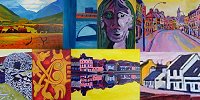

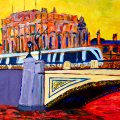
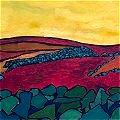
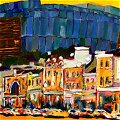
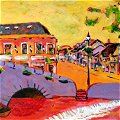
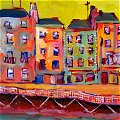
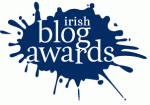
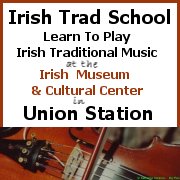


Fair play, Eolaí. I was going to write about this one myself, having read the article. But you did a better job than I could have hoped to.
Personally, I found it an eye-opener. Words like Dude, Snazzy and Jazz? Words that are the epitome of American slang?
I had to laugh!
Your comments about Jazz is very interesting to me as I am a music teacher (band director) at the High School in Kearney, NE. It would make a lot of sense that this is the case because New Orleans, being the birthplace of Jazz, has a huge Irish population. Being a microcosm of this country, New Orleans is infused with cultural influences and it starts to become ambiguous as to where certain foods, words, music, or art comes from.
I will have to do more reading on this. I have to go conduct my band right now, actually! Thanks for the post, Eolai!
Aaron
Thats crazy, crazy on a stick!
To bad Cassedy’s scholarship is uncredible. The entire basis of his theories–and they are only theories–is one of phonetic similarities. That’s an amateur’s mistake and an unforgivable one. Not only that, but he fudges quite a few of his definitions of the Irish Gaelic in order to make them fit. And in all of his work that I’ve seen so far–his book is on its way to me–there is no written nor historical trail connecting his theories to current usage. So, caveat lector. A whackjob with a book at Counterpunch is still a whackjob. And Irish discrimination be damned! I’ve got enough Irish blood in me to make me mayor of Dublin.
Michael, my problem so far with Cassidy - and I haven’t read the book either - that he talks about the slang being formed by a people (the Irish-American) “who remembered what they didn’t know”, in reference to Gaeilge.
In the Irish Times article referred to in this post there is this on the historical trail of the term “jazz” :
I got the impression that phonetic similarities was merely the starting point for his research rather than the entire basis - but I’m reserving judgment until I read the book. If the basis was obviously flawed I would have expected Kate Holmquist to have seriously questioned it.
Judgement reserved until read by me too. What I am hoping for is that I will see cross references in the book to the other languages spoken at the time. The glaring example from above being that Spiel was more likely a direct import from German.
Michael Scott Writes:
“To bad Cassedy’s scholarship is uncredible. The entire basis of his theories–and they are only theories–is one of phonetic similarities. That’s an amateur’s mistake and an unforgivable one. Not only that, but he fudges quite a few of his definitions of the Irish Gaelic in order to make them fit. And in all of his work that I’ve seen so far–his book is on its way to me….”
Someone discussing a book without reading it should be careful using “uncredibe”.
It would also help if you could spell: “uncredible” and CASSIDY.
You must be a neocon: never letting facts get in the way of opinions.
Michael (Cassidy), thanks for stopping by.
I’d love to hear your thoughts on Primal’s wonderings as to whether the book includes cross references to the other languages spoken contemporaneously - either in general or just the specific case of Spiel referred to.
Looks to me like he spelled “uncredible” correctly, though it would have been clearer to write “not credible” I think.
eolai,
You realize I’m “Michael” not “Daniel.”
If you wish to discuss C, C++, Lisp, or the influence computers and networking on American slang I’ll be happy to join in.
Thanks for correction Ellen, you’re right. Though I still think someone reviewing a book without having read it is pretty uncredible, incredible and not credible. In the world I’ve grown up in you can be right and/or wrong, but you do not want to be ‘Not Even Wrong” to quote Pauli.
For non-geeks [wikipedia]: “The phrase “not even wrong” is often used to describe pseudoscience or bad science. It is considered mildly derogatory.” “Mildly” is putting it mildly.
Michael Scott was not even wrong.
BTW, I have read the book.
Do I consider every word/entry in the book correct? No.
It would be amazing if that were true. One word I do consider correct is jazz.
Also, to hear/read over and over that the Irish language hasn’t contributed to English unlike every other language would/should be THE area of study and research for everyone in linguistics and language. Why? Because in real science the exceptions show you the way. If the Irish language did not contribute to English THEN you can learn more about the interactions of language by studying Irish-English interaction [or the lack of it] then studying the influence of Greek, Italian etc. But hey that’s just what would go on in the sciences.
Michael,
Yes I did realise who you were (weren’t), and then I’m so fuddled these days with organising moving back to Ireland that I didn’t, and then I did again - if you can believe that.
No I really don’t want to discuss C++ or any computing terms and their influence on American slang, thanks - I fear I already know too much about computing terms and it makes me feel icky.
But as you did read the book, and don’t consider that all entries are correct do you recall if the entry on spiel did cross reference German usage at that time, or if in general the book cross references other languages spoken at that time?
To be completely upfront I am Dan’s brother. I had not really intended defend the book; I was taken back by comments when it had not been read.
Yes he does briefly mention the German ’speal’
“But as you did read the book, and don’t consider that all entries are correct”, I also believe many are correct. I don’t feel comfortable defending his work - I’ll make mistakes he will not. He is in Ireland at the moment.
Because I’ve been listening to Jazz since the 60’s; I know some of the problems with the word jazz before he even discussed what he had found in newspaper and his dictionary. I knew of Ellington, David Murray and many other musicians dislike of the word jazz as demeaning; preventing jazz from being taken as ’serious music, to use the NY Times phrase.
Two things pushed me to encourage him:
1. The general acceptance the Irish did not contribute to English; this seemed silly especially since no one seemed to be researching the ‘why.’ I do not understand someone studying the influences of languages on English and fluffing this off. I do not believe this would happen in Physics, Chemistry or Biology. Physicist are going crazy trying to figure out why gravity is so weak compared to the other fundamental forces. The exception is important.
2. I was always told Irish died with the famine. YET in the 1920 U.S. Census I kept finding people saying their parents spoke Irish.
And I guess a third; it hard to believe a group so verbal as the Irish would contribute no vocabulary to English.
The English and Irish have a long history of interaction words had to migrant.
He will be back soon I’ll try and get him here.
He was speaking at the Belfast Festival and then several other places in Ireland this month.
Thanks Michael. I appreciate your reluctance to get caught up in defending the book.
To be honest there isn’t really any criticism here beyond the comment you addressed.
Perhaps me even asking questions is bit silly before actually reading the book - but it was hard not to, it being a fascinating subject.
Your reasons for encouragement all make sense as does your belief in studying exceptions. From what I’ve read over the years, and without having read Dan’s book, I believe in his Jazz theory and was espousing it over the weekend.
When Ireland as a nation switched from speaking Irish to English it did extreemely fast due to the politics of the day. That speed meant there was a huge influence in how the Irish speak English from the Gaeilge, not just in individual words but in idioms and structure. It makes sense to me that a sudden switching from Irish to English in America would also leave its mark somewhere.
Oh, and just to note that in mentioning you not considering all entries in the book to be correct my understanding was that you were only referring to a small minority - sorry if I gave a different impression.
Dan Cassidy’s visit to Ireland to launch the book was covered in yesterday’s Irish Independent*.
The work has been well received throughout Ireland. But then it would be, wouldn’t it. We love this kind of thing.
Of his first audience, one in Donegal, half of the assembled being native speakers, he is quoted as saying “… the reaction I’ve had has been beyond my wildest imagination”.
I won’t be reading the book for some time yet. I can’t afford it. Or any other book right now. So I can only go by the few examples here and in the newspaper.
Babe : bab, a baby, woman or term of affection.
I can’t buy into this. Surely it is simply a form of baby.
Braggers : breagoir, a liar.
I’d buy this if it weren’t for the word braggart being in use in English since the mid to late 1500’s. Perhaps the word came into Irish from English, or French.
Moolah : moll óir, a pile of gold or money.
This I do accept. Moll on it’s own, means heap, but generally refers to a heap of money.
It is all very interesting and I’ll get the book when I can. I wonder if anyone has done some work on the influence of the Hiberno-English idiom and structure that you mention, Eolaí. That would be extremely interesting too.
*I can’t find a link. The Indo’s new-look website is a pig to search. There’s no obvious archive link. I hate it when folks fix something that’s not broken.
For all who would doubt the information in Dan’s Book, you are advised to learn more about linguistics
http://www.edu-cyberpg.com/linguistics/
If you are not familiar with what a dialect is and have never studied this topic this will explain how words in fact are borrowed and there is pages of research to see for yourself especially on Page 3.
Karen Ellis
Educational CyberPlayGround